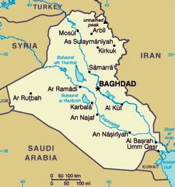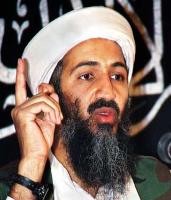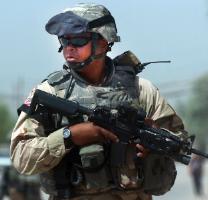This Commentary article by Peter Feaver, who served as special adviser for strategic planning to the NSC from 2005-2007, is about as positive a spin as can be put on the failures made in prosecuting of the Iraq War, complete with a very rosy appraisal of how the Surge managed to turn things around in the nick of time. About the only sentence in the article that I agreed with was this one: The Petraeus-Crocker report to Congress will no doubt offer further evidence that the new approach is working but is far from having completed its assigned task. No […]
Iraq Archive
Free Newsletter
Here’s Marc Lynch trying to turn charcoal into gold: . . .the campaign could be positive if it restored the sovereignty of the Iraqi state over Basra. I’ve been arguing for many months for the urgency of establishing some semblance of effective Iraqi sovereignty, defined in Weberian terms as a monopoly on the legitimate means of violence. The best-case scenario here might be that the Sadr-Maliki truce evolves into a shared effort to extend the sovereignty of the Iraqi state, with the Sadrists and the government working together to curb extralegal armed activities. I don’t think this was the real […]
As critical as I’ve been about recent developments in Iraq, I thought I’d link to this Foreign Policy article by Jason Gluck that suggests that the Iraqi political process is not as hopeless as I’ve suggested. Yesterday I mentioned the challenge of finding metrics that actually reflect what’s going on in Iraq, as opposed to what we want to see. The kind of legislative compromise Gluck describes is tough to quantify, but significant. Hopefully it’s not also irrelevant in light of this week’s violence. Meanwhile, in a sign that Maliki’s crackdown on Moqtada al-Sadr’s Mahdi militia was either pre-mature or […]

Various explanations have been posited to make sense of the ongoing Iraqi Army operation codenamed Sawlat al-Fursan (Attack of the Knights), which has been directed against the Jaysh al-Mahdi (JAM) throughout the south of Iraq. Marc Lynch summarizes the various theories that have gained traction in explaining the motivations for launching the Basra offensive at this juncture, and most of the more persuasive arguments focus on the motivations and rationales of the Iraqi actors: [1] “Iran is liquidating its no longer useful proxies” theory (which would fit this general line of speculation about Iran’s doubts about Sadr and preference for […]
Hampton makes a good point that the violence in Basra is occurring in the aftermath of British withdrawal, with the subsequent power vacuum it left. Spencer Ackerman elaborates on that here (via Andrew Sullivan), drawing some conclusions along the way about what America needs to consider in fashioning its own eventual troop withdrawal. So, yes, this isn’t a failure of the Surge in operational (ie. tactical) terms, since the Surge took place in another province. But remember that in January 2007, when President Bush announced plans for the Surge, the British had all of 7,000 troops in Basra province. A […]
If what we’re hearing about the the intra-Shiite fighting in Basra is true, it’s an operation that’s been signalled for weeks, which means it’s been planned for longer than that. It’s also pretty obvious, as Phillip Carter observes over at Intel Dump, that Prime Minister Nuri Kamal al-Maliki is using the Iraqi security forces to consolidate his hold on power. Which basically means that the factional differences that were supposed to be resolved in the political arena through reconciliation are being settled in the street with mortar and rocket fire, and that this was the plan for quite a while. […]
Over the course of a well-needed break for the Easter weekend, I actually got around to reading some printed news, which is how I ran across this interview in the Nouvel Observateur with Iraq specialist Pierre-Jean Luizard. In it he expresses some of the broader strategic flaws of the Anbar Awakening which have been ignored due to the tactical success the strategy has had in terms of reducing Sunni violence directed at American forces. Like most criticisms of the Awakening, Luizard’s analysis begins with the vacuum that passes for the Iraqi state. But Luizard suggests that the dynamic has become […]
I’ve shied away from discussing the fifth anniversary of the Iraq War because most of the analysis I’ve seen didn’t seem to add anything new to our understanding of the situation on the ground or the terms of our domestic debate. The former remains cloudy and depends largely on whether you believe the Surge has been a tactical success or a strategic miscalculation, and as a consequence, the latter seems reduced to the realm of tactics and policy, to the detriment of strategy and history. A satisfying exception is Simon Serfaty’s monograph, A Bad War Gone Worse, from The Washington […]
The Times had an article over the weekend on the various ways Iraqi militias and insurgents skim and scam the country’s oil revenues for funding. This morning, in a delayed reaction to the piece, it occurred to me that it might explain why we don’t hear much about insurgents targetting the oil infrastructure anymore. The only dedicated reporting I could come up with was this pretty extensive listing, called Iraq Pipeline Watch, which anecdotally confirms that attacks against infrastructure seemed to taper off in the middle of last year, replaced largely by attacks against infrastructure security forces. There’s a caveat […]
On the heels of the release of the Pentagon’s definitive study demonstrating that there was no pre-Iraq War link between Saddam Hussein and al-Qaida, comes this WPR feature from Bernard Finel arguing that recent progress in Iraq should not be confused with progress against the global terrorist threat: We are slowly digging ourselves out of the hole of the Iraq war. Al-Qaida has increasingly been marginalized in Iraq, and the success of American counterinsurgency efforts has diminished the perception that we can be defeated quickly or easily. And yet, Iraq remains a net negative in the overall struggle. . . […]

The recent decline in violence in Iraq is not synonymous with progress in the war on terror. Instead, the debate over the success of the Iraq surge strategy is a dangerous distraction from the “long, hard slog” that awaits us in the fight against violent extremism. Four-and-a-half years ago, then-U.S. Defense Secretary Donald Rumsfeld used that phrase to refer to the wars in Afghanistan and Iraq in a notorious 2003 memo titled “Global War on Terror.” In that same internal dispatch, Rumsfeld also stated that “we lack the metrics to know if we are winning or losing the global war […]
Gian Gentile’s WPR article, Misreading the Surge, has touched off a minor firestorm which, fortunately, is creating more light than heat. Phillip Carter over at Intel Dump has all the relevant links so far, and a brief pro-con summary even made it onto Andrew Sullivan’s site over the weekend. Not bad for what at first glance might seem like arcane COIN tactical debates. The debate is a crucially important one to have, though, because in war, narrative matters. And while that seems obvious when it comes to parsing defeat (the Vietnam War is a prime example), it’s also true in […]
If you haven’t yet read Nir Rosen’s Rolling Stone article, The Myth of the Surge, definitely click through and give it a look. It provides anecdotal support, but support nonetheless, for all the caveats being attached to the recent progress in Iraq, especially as concerns the Sunni Awakening. But it also anecdotally supports the image that’s beginning to emerge of a low-intensity, quasi-suspended civil war under way in Iraq, ie. the exact opposite of what the Surge was designed to accomplish. It’s already clear that the American military approach to the complexities of Iraq has been to assemble a network […]
Call me a cynic, but Iraqi President Jalal Talabani’s historic visit to Ankara accompanied by the Iraqi Ministers of Finance, Oil and Industry seems like a tip-off as to why the Turkish incursion into the Qandil Mountains didn’t set off a regional conflagration. The fact that the Iraqi Minister of National Security (talk bout a dead-letter office) went along for the ride does nothing to reduce the suggestion of a modus operandus being put into place. What’s often ignored in the alarmist coverage of the Turkey-PKK conflict is that the Turks and Iraqi Kurds have enormous mutual economic interests, and […]
Via the Small Wars Journal blog comes a Spencer Ackerman piece on the battle raging within the Army officer corps over just what balance to strike between traditional high-intensity warfare capabilities and counterinsurgency (COIN) operations. We’ve had our finger on the pulse of this debate in one form or another for the past week or so, based in part on a WPR opinion piece contributed by one of the protagonists of Ackerman’s article, Gian Gentile. Gentile warns that we’re in the process of over-compensating for past COIN failures, and uses the 2006 Israeli-Hizbollah war as an example of the dangers […]
This is important, and not just for what Gian Gentile says about the mistaken credit given to the Surge for reducing violence in Iraq. It’s a military truism that an army often prepares to fight the last war. So while there are a number of positive conclusions to be drawn about the U.S. Army’s adoption of a more nuanced counterinsurgency posture, it’s also important to remember that there is no guarantee that the next enemy the American military faces will be an insurgency. Between the pre-invasion purges (Shinseki) and post-invasion failures (Sanchez, Casey) of the old school generals, Iraq has […]

The Israeli experience in Lebanon in the summer of 2006 should warn Americans against having an Army that has become so focused on irregular and counterinsurgency warfare that it can no longer fight large battles against a conventional enemy. In an important essay in the Journal of Strategic Studies, Israeli scholar Avi Kober recently noted that years of policing by the Israeli Army in its territories had degraded its ability to fight the Hezbollah enemy that used conventional tactics. The result was a significant battlefield defeat for the Israeli Army. The American Army is in a similar condition today, and […]
